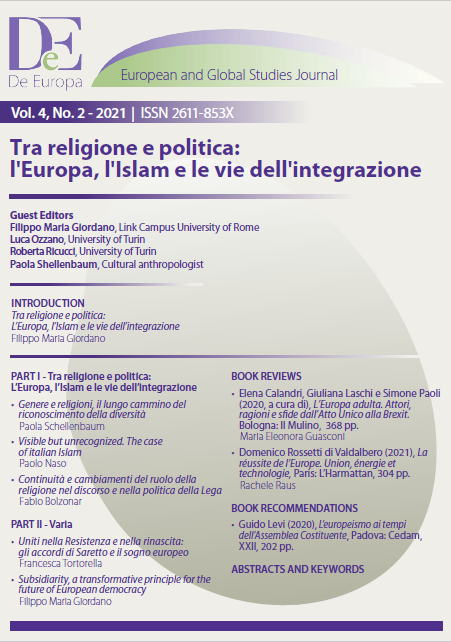Continuità e cambiamenti del ruolo della religione nel discorso e nella politica della Lega
DOI:
https://doi.org/10.13135/2611-853X/6187Abstract
This article studies the role played by religion in the discourse and politics of the League. In its thirty years of life, this party has dramatically changed its ‘religious politics’. If the League of the early nineties was a secular movement that did not disdain to support anti-clerical positions, from the second half of that decade it undertook a ‘conversion’ to Catholicism, which led it, especially after the election of Matteo Salvini as party secretary in 2013, to become a movement that proudly claims its religious roots and presents itself as the most staunch defender of the Christian identity of Italy and
Europe. The article analyzes the characteristics of the League's politicization of religion, describes the dynamics of this phenomenon and proposes an explanation of it. Particular attention is paid to the League's evocation of religion to stigmatize Islam, the main target of the propaganda of this party that tends to represent this religion as incompatible with the European civilization. The main argument supported by the article consists in the idea that the evocation of religious values, symbols and narratives by the League is the result of a process of adaptation to the national political-cultural context, thereby the leaders of the Lega have evoked religion to consolidate the party ideology, adapt it to the demands of the electorate, and seize new political
opportunities. In this sense, for the League, religion is tool for pursuing power and implementing an exclusionary politics. The article also documents the growing opposition by a part of Italian Catholicism to the League's politicization of religious symbols and shows how the League's leaders have responded to the criticisms that they received by arguing that their policies are consistent with the Catholic teaching and presenting themselves as the best defenders of the requests from Catholic citizens. The most recent phase of the League's evocation of religion has thus turned into an open
confrontation with the Catholic Church.
Keywords: Lega, populism, radical right, Islam, religion.
Questo articolo studia il ruolo della religione nel discorso e nella politica della Lega. Nei suoi trent’anni di vita, questo partito ha radicalmente mutato la propria ‘politica religiosa’. Se la Lega dei primi anni novanta fu movimento secolare che non disdegnava di sostenere posizioni anti-clericali, dalla seconda metà di quel decennio esso intrapreseuna ‘conversione’ al Cattolicesimo, che la portò, soprattutto dopo l’elezione di Matteo Salvini a segretario nel 2013, a diventare un movimento che rivendica con orgoglio le proprie radici religiose e si presenta come il piu’ strenuo difensore dell’identità cristiana dell’Italia e dell’Europa. L’articolo analizza le caratteristiche della politicizzazione leghista della religione, descrive le dinamiche di tale fenomeno e ne propone una spiegazione. Particolare attenzione viene dedicata all’evocazione leghista della religione per stigmatizzare l’Islam, il principale bersaglio della propaganda leghista che tende a rappresentare questa religione come incompatibile con la civiltà europea. L’argomento
principale sostenuto dall’articolo consiste nell’idea che l’evocazione di valori, simboli e narrazioni religiose da parte della Lega sia il risultato di un processo di adattamento al contesto politico-culturale nazionale tale per cui i leader leghisti hanno evocato con crescente frequenza la religione per consolidare l’ideologia del proprio partito, adattarsi alle domande dell’elettorato e cogliere nuove opportunità politiche. In questo senso, per la Lega la religione è uno strumento per il perseguimento del potere e attuare una politica esclusionaria. L’articolo documenta anche la crescente opposizione di una parte del Cattolicesimo italiano alla politicizzazione leghista di simboli religiosi e mostra come i leader leghisti abbiano replicato alle critiche ricevute sostenendo come le loro politiche siano consistenti con l’insegnamento cattolico e presentandosi come i migliori difensori delle richieste dei cittadini cattolici. La fase più recente dell’evocazione della religione da parte della Lega si è così trasformata in uno scontro aperto con la Chiesa Cattolica.
Parole chiave: Lega, populismo, destra radicale, Islam, religione.




 The journal has been approved for inclusion in DOAJ. The DOAJ listing of the journal is available at
The journal has been approved for inclusion in DOAJ. The DOAJ listing of the journal is available at 

